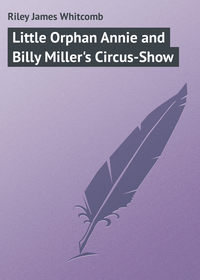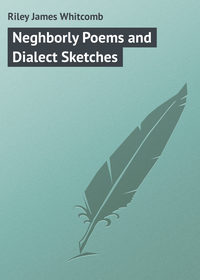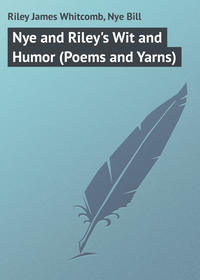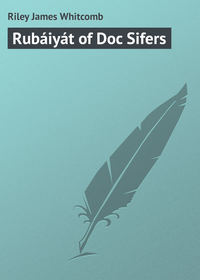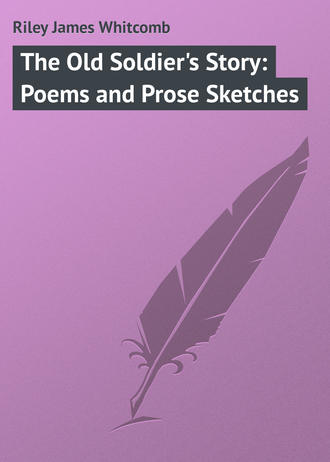 полная версия
полная версияThe Old Soldier's Story: Poems and Prose Sketches

Riley James Whitcomb
The Old Soldier's Story: Poems and Prose Sketches
THE OLD SOLDIER'S STORY
AS TOLD BEFORE THE NEW ENGLAND SOCIETY IN NEW YORK CITYSince we have had no stories to-night I will venture, Mr. President, to tell a story that I have heretofore heard at nearly all the banquets I have ever attended. It is a story simply, and you must bear with it kindly. It is a story as told by a friend of us all, who is found in all parts of all countries, who is immoderately fond of a funny story, and who, unfortunately, attempts to tell a funny story himself – one that he has been particularly delighted with. Well, he is not a story-teller, and especially he is not a funny story-teller. His funny stories, indeed, are oftentimes touchingly pathetic. But to such a story as he tells, being a good-natured man and kindly disposed, we have to listen, because we do not want to wound his feelings by telling him that we have heard that story a great number of times, and that we have heard it ably told by a great number of people from the time we were children. But, as I say, we can not hurt his feelings. We can not stop him. We can not kill him; and so the story generally proceeds. He selects a very old story always, and generally tells it in about this fashion: —
I heerd an awful funny thing the other day – ha! ha! I don't know whether I kin git it off er not, but, anyhow, I'll tell it to you. Well! – le's see now how the fool-thing goes. Oh, yes! – W'y, there was a feller one time – it was durin' the army, and this feller that I started in to tell you about was in the war, and – ha! ha! – there was a big fight a-goin' on, and this feller was in the fight, and it was a big battle and bullets a-flyin' ever' which way, and bombshells a-bu'stin', and cannon-balls a-flyin' 'round promiskus; and this feller right in the midst of it, you know, and all excited and het up, and chargin' away; and the fust thing you know along come a cannon-ball and shot his head off – ha! ha! ha! Hold on here a minute! – no sir; I'm a-gittin' ahead of my story; no, no; it didn't shoot his head off – I'm gittin' the cart before the horse there – shot his leg off; that was the way; shot his leg off; and down the poor feller drapped, and, of course, in that condition was perfectly he'pless, you know, but yit with presence o' mind enough to know that he was in a dangerous condition ef somepin' wasn't done fer him right away. So he seen a comrade a-chargin' by that he knowed, and he hollers to him and called him by name – I disremember now what the feller's name was…
Well, that's got nothin' to do with the story, anyway; he hollers to him, he did, and says, "Hello, there," he says to him; "here, I want you to come here and give me a lift; I got my leg shot off, and I want you to pack me back to the rear of the battle" – where the doctors always is, you know, during a fight – and he says, "I want you to pack me back there where I can get med-dy-cinal attention er I'm a dead man, fer I got my leg shot off," he says, "and I want you to pack me back there so's the surgeons kin take keer of me." Well – the feller, as luck would have it, ricko-nized him and run to him and throwed down his own musket, so's he could pick him up; and he stooped down and picked him up and kindo' half-way shouldered him and half-way helt him betwixt his arms like, and then he turned and started back with him – ha! ha! ha! Now, mind, the fight was still a-goin' on – and right at the hot of the fight, and the feller, all excited, you know, like he was, and the soldier that had his leg shot off gittin' kindo fainty like, and his head kindo' stuck back over the feller's shoulder that was carryin' him. And he hadn't got more'n a couple o' rods with him when another cannon-ball come along and tuk his head off, shore enough! – and the curioust thing about it was – ha! ha! – that the feller was a-packin' him didn't know that he had been hit ag'in at all, and back he went – still carryin' the deceased back – ha! ha! ha! – to where the doctors could take keer of him – as he thought. Well, his cap'n happened to see him, and he thought it was a ruther cur'ous p'ceedin's – a soldier carryin' a dead body out o' the fight – don't you see? And so he hollers at him, and he says to the soldier, the cap'n did, he says, "Hullo, there; where you goin' with that thing?" the cap'n said to the soldier who was a-carryin' away the feller that had his leg shot off. Well, his head, too, by that time. So he says, "Where you goin' with that thing?" the cap'n said to the soldier who was a-carryin' away the feller that had his leg shot off. Well, the soldier he stopped – kinder halted, you know, like a private soldier will when his presidin' officer speaks to him – and he says to him, "W'y," he says, "Cap, it's a comrade o' mine and the pore feller has got his leg shot off, and I'm a-packin' him back to where the doctors is; and there was nobody to he'p him, and the feller would 'a' died in his tracks – er track ruther – if it hadn't a-been fer me, and I'm a-packin' him back where the surgeons can take keer of him; where he can get medical attendance – er his wife's a widder!" he says, "'cause he's got his leg shot off!" Then Cap'n says, "You blame fool you, he's got his head shot off." So then the feller slacked his grip on the body and let it slide down to the ground, and looked at it a minute, all puzzled, you know, and says, "W'y, he told me it was his leg!" Ha! ha! ha!
SOMEP'N COMMON-LIKE
Somep'n 'at's common-like, and goodAnd plain, and easy understood;Somep'n 'at folks like me and youKin understand, and relish, too,And find some sermint in 'at hitsThe spot, and sticks and benefits.We don't need nothin' extry fine;'Cause, take the run o' minds like mine,And we'll go more on good horse-senseThan all your flowery eloquence;And we'll jedge best of honest actsBy Nature's statement of the facts.So when you're wantin' to expressYour misery, er happiness,Er anything 'at's wuth the timeO' telling in plain talk er rhyme —Jes' sort o' let your subject runAs ef the Lord wuz listenun.MONSIEUR LE SECRETAIRE
[JOHN CLARK RIDPATH]Mon cher Monsieur le Secretaire,Your song flits with me everywhere;It lights on Fancy's prow and singsMe on divinest voyagings:And when my ruler love would fainBe laid upon it – high againIt mounts, and hugs itself from meWith rapturous wings – still dwindlingly —On! – on! till but a ghost is thereOf song, Monsieur le Secretaire!A PHANTOM
Little baby, you have wandered far away,And your fairy face comes back to me to-day,But I can not feel the strandsOf your tresses, nor the playOf the dainty velvet-touches of your hands.Little baby, you were mine to hug and hold;Now your arms cling not about me as of old —O my dream of rest come true,And my richer wealth than gold,And the surest hope of Heaven that I knew!O for the lisp long silent, and the toneOf merriment once mingled with my own —For the laughter of your lips,And the kisses plucked and thrownIn the lavish wastings of your finger-tips!Little baby, O as then, come back to me,And be again just as you used to be,For this phantom of you standsAll too cold and silently,And will not kiss nor touch me with its hands.IN THE CORRIDOR
Ah! at last alone, love!Now the band may playTill its sweetest tone, love,Swoons and dies away!They who most will miss usWe're not caring for —Who of them could kiss usIn the corridor?Had we only known, dear,Ere this long delay,Just how all alone, dear,We might waltz away,Then for hours, like this, love,We are longing for,We'd have still to kiss, love,In the corridor!Nestle in my heart, love;Hug and hold me close —Time will come to part, love,Ere a fellow knows;There! the Strauss is ended —Whirl across the floor:Isn't waltzing splendidIn the corridor?LOUELLA WAINIE
Louella Wainie! where are you?Do you not hear me as I cry?Dusk is falling; I feel the dew;And the dark will be here by and by:I hear no thing but the owl's hoo-hoo!Louella Wainie! where are you?Hand in hand to the pasture barsWe came loitering, Lou and I,Long ere the fireflies coaxed the starsOut of their hiding-place on high.O how sadly the cattle moo!Louella Wainie! where are you?Laughingly we parted here —"I will go this way," said she,"And you will go that way, my dear" —Kissing her dainty hand at me —And the hazels hid her from my view.Louella Wainie! where are you?Is there ever a sadder thingThan to stand on the farther brinkOf twilight, hearing the marsh-frogs sing?Nothing could sadder be, I think!And ah! how the night-fog chills one through.Louella Wainie! where are you?Water-lilies and oozy leaves —Lazy bubbles that bulge and stareUp at the moon through the gloom it weavesOut of the willows waving there!Is it despair I am wading through?Louella Wainie! where are you?Louella Wainie, listen to me,Listen, and send me some reply,For so will I call unceasinglyTill death shall answer me by and by —Answer, and help me to find you too!Louella Wainie! where are you?THE TEXT
The text: Love thou thy fellow man!He may have sinned; – One proof indeed,He is thy fellow, reach thy handAnd help him in his need!Love thou thy fellow man. He mayHave wronged thee – then, the less excuseThou hast for wronging him. ObeyWhat he has dared refuse!Love thou thy fellow man – for, beHis life a light or heavy load,No less he needs the love of theeTo help him on his road.WILLIAM BROWN
"He bore the name of William Brown" —His name, at least, did not go downWith him that dayHe went the wayOf certain death where duty lay.He looked his fate full in the face —He saw his watery resting-placeUndaunted, andWith firmer handHeld others' hopes in sure command. —The hopes of full three hundred lives —Aye, babes unborn, and promised wives!"The odds are dread,"He must have said,"Here, God, is one poor life instead."No time for praying overmuch —No time for tears, or woman's touchOf tenderness,Or child's caress —His last "God bless them!" stopped at "bless" —Thus man and engine, nerved with steel,Clasped iron hands for woe or weal,And so went downWhere dark waves drownAll but the name of William Brown.WHY
Why are they written – all these lovers' rhymes?I catch faint perfumes of the blossoms whiteThat maidens drape their tresses with at night,And, through dim smiles of beauty and the dinOf the musicians' harp and violin,I hear, enwound and blended with the dance,The voice whose echo is this utterance, —Why are they written – all these lovers' rhymes?Why are they written – all these lovers' rhymes?I see but vacant windows, curtained o'erWith webs whose architects forevermoreRace up and down their slender threads to bindThe buzzing fly's wings whirless, and to windThe living victim in his winding sheet. —I shudder, and with whispering lips repeat,Why are they written – all these lovers' rhymes?Why are they written – all these lovers' rhymes?What will you have for answer? – Shall I sayThat he who sings the merriest roundelayHath neither joy nor hope? – and he who singsThe lightest, sweetest, tenderest of thingsBut utters moan on moan of keenest pain,So aches his heart to ask and ask in vain,Why are they written – all these lovers' rhymes?THE TOUCH OF LOVING HANDS
IMITATEDLight falls the rain-drop on the fallen leaf,And light o'er harvest-plain and garnered sheaf —But lightlier falls the touch of loving hands.Light falls the dusk of mild midsummer night,And light the first star's faltering lance of lightOn glimmering lawns, – but lightlier loving hands.And light the feathery flake of early snows,Or wisp of thistle-down that no wind blows,And light the dew, – but lightlier loving hands.Light-falling dusk, or dew, or summer rain,Or down of snow or thistle – all are vain, —Far lightlier falls the touch of loving hands.A TEST
'Twas a test I designed, in a quiet conceitOf myself, and the thoroughly fixed and completeSatisfaction I felt in the utter controlOf the guileless young heart of the girl of my soul.So – we parted. I said it were better we should —That she could forget me – I knew that she could;For I never was worthy so tender a heart,And so for her sake it were better to part.She averted her gaze, and she sighed and looked sadAs I held out my hand – for the ring that she had —With the bitterer speech that I hoped she might beResigned to look up and be happy with me.'Twas a test, as I said – but God pity your grief,At a moment like this when a smile of reliefShall leap to the lips of the woman you prize,And no mist of distress in her glorious eyes.A SONG FOR CHRISTMAS
Chant me a rhyme of Christmas —Sing me a jovial song, —And though it is filled with laughter,Let it be pure and strong.Let it be clear and ringing,And though it mirthful be,Let a low, sweet voice of pathosRun through the melody.Sing of the hearts brimmed overWith the story of the day —Of the echo of childish voicesThat will not die away. —Of the blare of the tasselled bugle,And the timeless clatter and beatOf the drum that throbs to musterSquadrons of scampering feet. —Of the wide-eyed look of wonder,And the gurgle of baby-glee,As the infant hero wrestlesFrom the smiling father's knee.Sing the delights unboundedOf the home unknown of care,Where wealth as a guest abideth,And want is a stranger there.But O let your voice fall fainter,Till, blent with a minor tone,You temper your song with the beautyOf the pity Christ hath shown:And sing one verse for the voiceless;And yet, ere the song be done,A verse for the ears that hear not,And a verse for the sightless one:And one for the outcast mother,And one for the sin-defiledAnd hopeless sick man dying,And one for his starving child.For though it be time for singingA merry Christmas glee,Let a low, sweet voice of pathosRun through the melody.SUN AND RAIN
All day the sun and rain have been as friends,Each vying with the other which shall beMost generous in dowering earth and seaWith their glad wealth, till each, as it descends,Is mingled with the other, where it blendsIn one warm, glimmering mist that falls on meAs once God's smile fell over Galilee.The lily-cup, filled with it, droops and bendsLike some white saint beside a sylvan shrineIn silent prayer; the roses at my feet,Baptized with it as with a crimson wine,Gleam radiant in grasses grown so sweet,The blossoms lift, with tenderness divine,Their wet eyes heavenward with these of mine.WITH HER FACE
With her face between his hands!Was it any wonder sheStood atiptoe tremblingly?As his lips along the strandsOf her hair went lavishingTides of kisses, such as swingLove's arms to like iron bands. —With her face between his hands!And the hands – the hands that pressedThe glad face – Ah! where are they?Folded limp, and laid awayIdly over idle breast?He whose kisses drenched her hair,As he caught and held her there,In Love's alien, lost lands,With her face between his hands?Was it long and long ago,When her face was not as now,Dim with tears? nor wan her browAs a winter-night of snow?Nay, anointing still the strandsOf her hair, his kisses flowFlood-wise, as she dreaming stands,With her face between his hands.MY NIGHT
Hush! hush! list, heart of mine, and hearken low!You do not guess how tender is the Night,And in what faintest murmurs of delightHer deep, dim-throated utterances flowAcross the memories of long-ago!Hark! do your senses catch the exquisiteStaccatos of a bird that dreams he sings?Nay, then, you hear not rightly, – 'tis a blurOf misty love-notes, laughs and whisperingsThe Night pours o'er the lips that fondle her,And that faint breeze, filled with all fragrant sighs, —That is her breath that quavers lover-wise —O blessed sweetheart, with thy swart, sweet kiss,Baptize me, drown me in black swirls of bliss!THE HOUR BEFORE THE DAWN
The hour before the dawn!O ye who grope therein, with fear and dreadAnd agony of soul, be comforted,Knowing, ere long, the darkness will be gone,And down its dusky aisles the light be shed;Therefore, in utter trust, fare on – fare on,This hour before the dawn!GOOD-BY, OLD YEAR
Good-by, Old Year!Good-by!We have been happy – you and I;We have been glad in many ways;And now, that you have come to die,Remembering our happy days,'Tis hard to say, "Good-by —Good-by, Old Year!Good-by!"Good-by, Old Year!Good-by!We have seen sorrow – you and I —Such hopeless sorrow, grief and care,That now, that you have come to die,Remembering our old despair,'Tis sweet to say, "Good-by —Good-by, Old Year!Good-by!"FALSE AND TRUE
One said: "Here is my hand to lean uponAs long as you may need it." And one said:"Believe me true to you till I am dead."And one, whose dainty way it was to fawnAbout my face, with mellow fingers drawnMost soothingly o'er brow and drooping head,Sighed tremulously: "Till my breath is fledKnow I am faithful!" … Now, all these are goneAnd many like to them – and yet I makeNo bitter moan above their grassy graves —Alas! they are not dead for me to takeSuch sorry comfort! – but my heart behavesMost graciously, since one who never spakeA vow is true to me for true love's sake.A BALLAD FROM APRIL
I am dazed and bewildered with livingA life but an intricate skeinOf hopes and despairs and thanksgivingWound up and unravelled again —Till it seems, whether waking or sleeping,I am wondering ever the whileAt a something that smiles when I'm weeping,And a something that weeps when I smile.And I walk through the world as one dreamingWho knows not the night from the day,For I look on the stars that are gleaming,And lo, they have vanished away:And I look on the sweet-summer daylight,And e'en as I gaze it is fled,And, veiled in a cold, misty, gray light,The winter is there in its stead.I feel in my palms the warm fingersOf numberless friends – and I look,And lo, not a one of them lingersTo give back the pleasure he took;And I lift my sad eyes to the facesAll tenderly fixed on my own,But they wither away in grimacesThat scorn me, and leave me alone.And I turn to the woman that told meHer love would live on until death —But her arms they no longer enfold me,Though barely the dew of her breathIs dry on the forehead so pallidThat droops like the weariest thingO'er this most inharmonious balladThat ever a sorrow may sing.So I'm dazed and bewildered with livingA life but an intricate skeinOf hopes and despairs and thanksgivingWound up and unravelled again —Till it seems, whether waking or sleeping,I am wondering ever the whileAt a something that smiles when I'm weeping,And a something that weeps when I smile.BRUDDER SIMS
Dah's Brudder Sims! Dast slam yo' Bible shetAn' lef' dat man alone – kase he's de bossOb all de preachahs ev' I come across!Day's no twis' in dat gospil book, I bet,Ut Brudder Sims cain't splanify, an' setYou' min' at eaze! W'at's Moses an' de Laws?W'at's fo'ty days an' nights ut Noey tossAroun' de Dil-ooge? – W'at dem Chillen etDe Lo'd rain down? W'at s'prise ole Joney soIn dat whale's inna'ds? – W'at dat laddah meanUt Jacop see? – an' wha' dat laddah go? —Who clim dat laddah? – Wha' dat laddah lean? —An' wha' dat laddah now? "Dast chalk yo' toeWid Faith," sez Brudder Sims, "an' den you know!"DEFORMED
Crouched at the corner of the streetShe sits all day, with face too whiteAnd hands too wasted to be sweetIn anybody's sight.Her form is shrunken, and a pairOf crutches leaning at her sideAre crossed like homely hands in prayerAt quiet eventide.Her eyes – two lustrous, weary things —Have learned a look that ever aches,Despite the ready jinglingsThe passer's penny makes.And, noting this, I pause and museIf any precious promise touchThis heart that has so much to loseIf dreaming overmuch —And, in a vision, mistilyHer future womanhood appears, —A picture framed with agonyAnd drenched with ceaseless tears —Where never lover comes to claimThe hand outheld so yearningly —The laughing babe that lisps her nameIs but a fantasy!And, brooding thus, all swift and wildA daring fancy, strangely sweet,Comes o'er me, that the crippled childThat crouches at my feet —Has found her head a resting-placeUpon my shoulder, while my kissAcross the pallor of her faceLeaves crimson trails of bliss.FAITH
The sea was breaking at my feet,And looking out across the tide,Where placid waves and heaven meet,I thought me of the Other Side.For on the beach on which I stoodWere wastes of sands, and wash, and roar,Low clouds, and gloom, and solitude,And wrecks, and ruins – nothing more."O, tell me if beyond the seaA heavenly port there is!" I cried,And back the echoes laughingly"There is! there is!" replied.THE LOST THRILL
I grow so weary, someway, of all thingThat love and loving have vouchsafed to me,Since now all dreamed-of sweets of ecstasyAm I possessed of: The caress that clings —The lips that mix with mine with murmuringsNo language may interpret, and the free,Unfettered brood of kisses, hungrilyFeasting in swarms on honeyed blossomingsOf passion's fullest flower – For yet I missThe essence that alone makes love divine —The subtle flavoring no tang of thisWeak wine of melody may here define: —A something found and lost in the first kissA lover ever poured through lips of mine.AT DUSK
A something quiet and subduedIn all the faces that we meet;A sense of rest, a solitudeO'er all the crowded street;The very noises seem to beCrude utterings of harmony,And all we hear, and all we see,Has in it something sweet.Thoughts come to us as from a dreamOf some long-vanished yesterday;The voices of the children seemLike ours, when young as they;The hand of Charity extendsTo meet Misfortune's, where it blends,Veiled by the dusk – and oh, my friends,Would it were dusk alway!ANOTHER RIDE FROM GHENT TO AIX
We sprang for the side-holts – my gripsack and I —It dangled – I dangled – we both dangled by."Good speed!" cried mine host, as we landed at last —"Speed?" chuckled the watch we went lumbering past;Behind shut the switch, and out through the rear doorI glared while we waited a half hour more.I had missed the express that went thundering downTen minutes before to my next lecture town,And my only hope left was to catch this "wild freight,"Which the landlord remarked was "most luckily late —But the twenty miles distance was easily done,If they run half as fast as they usually run!"Not a word to each other – we struck a snail's pace —Conductor and brakeman ne'er changing a place —Save at the next watering-tank, where they allGot out – strolled about – cut their names on the wall,Or listlessly loitered on down to the pileOf sawed wood just beyond us, to doze for a while.'Twas high noon at starting, but while we drew near"Arcady" I said, "We'll not make it, I fear!I must strike Aix by eight, and it's three o'clock now;Let me stoke up that engine, and I'll show you how!"At which the conductor, with patience sublime,Smiled up from his novel with, "Plenty of time!"At "Trask," as we jolted stock-still as a stone,I heard a cow bawl in a five o'clock tone;And the steam from the saw-mill looked misty and thin,And the snarl of the saw had been stifled within:And a frowzy-haired boy, with a hat full of chips,Came out and stared up with a smile on his lips.At "Booneville," I groaned, "Can't I telegraph on?"No! Why? "'Cause the telegraph-man had just goneTo visit his folks in Almo" – and one heardThe sharp snap of my teeth through the throat of a word,That I dragged for a mile and a half up the track,And strangled it there, and came skulkingly back.Again we were off. It was twilight, and more,As we rolled o'er a bridge where beneath us the roarOf a river came up with so wooing an airI mechanic'ly strapped myself fast in my chairAs a brakeman slid open the door for more light,Saying: "Captain, brace up, for your town is in sight!""How they'll greet me!" – and all in a moment – "chewang!"And the train stopped again, with a bump and a bang.What was it? "The section-hands, just in advance."And I spit on my hands, and I rolled up my pants,And I clumb like an imp that the fiends had let looseUp out of the depths of that deadly caboose.I ran the train's length – I lept safe to the ground —And the legend still lives that for five miles aroundThey heard my voice hailing the hand-car that yankedMe aboard at my bidding, and gallantly cranked,As I grovelled and clung, with my eyes in eclipse,And a rim of red foam round my rapturous lips.Then I cast loose my ulster – each ear-tab let fall —Kicked off both my shoes – let go arctics and all —Stood up with the boys – leaned – patted each headAs it bobbed up and down with the speed that we sped;Clapped my hands – laughed and sang – any noise, bad or good,Till at length into Aix we rotated and stood.And all I remember is friends flocking roundAs I unsheathed my head from a hole in the ground;And no voice but was praising that hand-car divine,As I rubbed down its spokes with that lecture of mine.Which (the citizens voted by common consent)Was no more than its due. 'Twas the lecture they meant.


